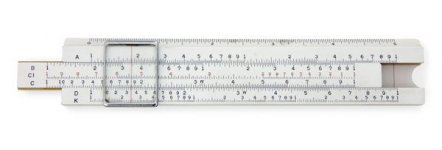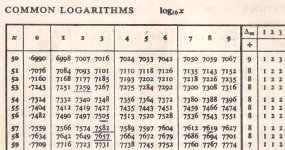Learning the multiplication tables of memory today can be questionable or not, but the important thing is to understand its meaning, the same happens with the percentages.
More than once I meet graduates of university studies who are challenged to add and subtract percentages and always fail at the same step:
You have 100 and you add 10 percent, how much is it?
110! They respond quickly.
Well, and now to those 110 take out the 10 percent you added, how much is it?
Almost always, they are wrong answering 100!
The correct result is 99, because the percentages can not add or subtract directly !
😕
I learned many elementary mathematics while in commerce and when the first hand calculators did not bring pocentajes.
Very simple, all the percentage you want to add multiplies it by adding it after number one followed by the point.
And all the percentages you want to subtract : whazzat: by adding it after the number zero and point.
For the previous example;
100 plus 10%?
100 x 1.1 = 110
100 minus 10%?
100 x 0.9 = 90
110 minus 10%?
110 x 0.9 = 99
And could you multiply with this relic? using only the sum function?
Well, you want to multiply 100 x 10, type 100 and move the crank, add a zero and move the crank again, you will see that on printed paper a column has moved equally to the left.
Well do it ten times and you had 1000!
Sorry OT
More than once I meet graduates of university studies who are challenged to add and subtract percentages and always fail at the same step:
You have 100 and you add 10 percent, how much is it?
110! They respond quickly.
Well, and now to those 110 take out the 10 percent you added, how much is it?
Almost always, they are wrong answering 100!
The correct result is 99, because the percentages can not add or subtract directly !
😕
I learned many elementary mathematics while in commerce and when the first hand calculators did not bring pocentajes.
Very simple, all the percentage you want to add multiplies it by adding it after number one followed by the point.
And all the percentages you want to subtract : whazzat: by adding it after the number zero and point.
For the previous example;
100 plus 10%?
100 x 1.1 = 110
100 minus 10%?
100 x 0.9 = 90
110 minus 10%?
110 x 0.9 = 99
And could you multiply with this relic? using only the sum function?
Well, you want to multiply 100 x 10, type 100 and move the crank, add a zero and move the crank again, you will see that on printed paper a column has moved equally to the left.
Well do it ten times and you had 1000!
Sorry OT
Attachments
Last edited:
You must be bright! 🙂 Trachtenberg system - Everything2.comI was also taught a lot of the Trachtenberg short cuts.
You have 100 and you add 10 percent, how much is it?
110! They respond quickly.
Well, and now to those 110 take out the 10 percent you added, how much is it?
Almost always, they are wrong answering 100!
The correct result is 99, because the percentages can not add or subtract directly !
Underline added. Pet peeve; incorrect answers often arise from the question structure. It's so common in the corporate training modules designed by our HR 'logicians' I began suspecting it's a devious meta test.
Taking out 10% of 110 results in 99. Taking out the 10% you added to 100 gives 100.
Last edited:
I was at University in the days before pocket calculators and had to rely heavily on my arithmetical skills.Despite all the tech, or because of it, good mental arithmetic is more important that ever...
I, in common with my fellow students, used slide rules to speed up lengthy calculations.
However, when using a slide rule, you still had to make a mental estimation of the magnitude of the expected answer.
I've seen today's students blindly accept the answer given on a pocket calculator, blissfully unaware that the answer is ridiculously impossible!
P.S. Slide rule image attached in case there are any actual 'youngers' in the audience!
Attachments
For all that I'm glad we were taught it up to 12x12.
I was also taught a lot of the Trachtenberg short cuts.
Despite all the tech, or because of it, good mental arithmetic is more important that ever...
I'm really glad I got acquainted with hexadecimal, and binary.
Boolean algebra isn't difficult, but still high on my list.
Underline added. Pet peeve; incorrect answers often arise from the question structure. It's so common in the corporate training modules designed by our HR 'logicians' I began suspecting it's a devious meta test.
Taking out 10% of 110 results in 99. Taking out the 10% you added to 100 gives 100.
"Pet peeve ??"
The only apology you have is that you have not understood, like many, you have the language faster than the mind. Don't offend, or I'll report
100 + 10 % = 110
110 - 10 % = 99
Last edited:
I'm fully comfortable with arithmetic. This is linguistic. Asking someone to subtract 10% from 110 is different than asking them to subtract the 10% they added to 100 to get 110. The 10% of 100 they added to get 110 is 10."Pet peeve ??"
The only apology you have is that you have not understood...
In your phrasing of the riddle the correct answer depends as much on context and intent as it does on arithmetic or intelligence.
I'm fully comfortable with arithmetic. This is linguistic. Asking someone to subtract 10% from 110 is different than asking them to subtract the 10% they added to 100 to get 110. The 10% of 100 they added to get 110 is 10.
In your phrasing of the riddle the correct answer depends as much on context and intent as it does on arithmetic or intelligence.
Leave it there, you are one of those people who deny the most obvious, for example climate change. And since I don't allow any fool to disrespect me, you just entered my ignore list.
Leave it there, you are one of those people who deny the most obvious, for example climate change. And since I don't allow any fool to disrespect me, you just entered my ignore list.
I most respectfully disagree, RDF is correct when he said it was a linguistic mistake, not a math error. Again, you can't add 10% to something and then remove that same amount and come out with less. Words do matter when we are trying to be precise and correct. Perhaps saying something like "Well, and now to those 110 take 10 percent out, how much is it?" It flows better logically, and phrases the question properly to arrive to the correct answer.
Mike
Last edited:
Speaking of youth being idiots there are currently 14 emergency vehicles outside my house and a 20 something just still alive. Lost control at I guess double the posted speed limit racing his mates after a car meet. Took out a 12"x12" gate post and reinforced gate. Wrote off both cars in the neihbours drive, pushing one 8 feet into the front of the house and the house is going to need a structural survey.
I only went into a hedge at speed at that age... By the grace of god.
Been 1 fatal and one near on that corner in last 3 years. Usually they hit the oak tree next to the gatepost. Not suprisingly they are trying to sell the house!
Now think of what our chances of living would’ve been with today’s tire technology? I realize that grippier tires are a two sided coin, however, think about sliding into a hedge at twice the speed because you had the added confidence from better tires.
It wasn’t that we were always that much better or safer...
By the way, that’s horrible to have to see, sorry to hear about that.
I will concede however that the screen time is taking away from the outdoor physical activities, and it is having a profound effect on basic survival skills; lack of applied physics.
Last edited:
Ha! To respond to the first part of this thread.
I'm a lucky bastard. Twice something exploded into my eye without causing damage. And I felt the tingle of a 4 microfarad cap charged to 2000 V.
Some 33 years ago I needed smoke for a photograph background, I went to the chemist and asked for potassium chlorate and ammonium chloride. It was sold to me in pointy paper bags. The chemist told me to be careful with it. The same shop still sells it, now it is managed by his daughter. I like those family-run businesses.
I'm a lucky bastard. Twice something exploded into my eye without causing damage. And I felt the tingle of a 4 microfarad cap charged to 2000 V.
Some 33 years ago I needed smoke for a photograph background, I went to the chemist and asked for potassium chlorate and ammonium chloride. It was sold to me in pointy paper bags. The chemist told me to be careful with it. The same shop still sells it, now it is managed by his daughter. I like those family-run businesses.
I most respectfully disagree, RDF is correct when he said it was a linguistic mistake, not a math error. Again, you can't add 10% to something and then remove that same amount and come out with less. Words do matter when we are trying to be precise and correct. Perhaps saying something like "Well, and now to those 110 take 10 percent out, how much is it?" It flows better logically, and phrases the question properly to arrive to the correct answer.
Mike
So you defend that they offend me with the phrase "peet peeve"?
What would it be, a mathematical, philosophical or linguistic problem?
My English is very bad but not enough to not realize the offensive sense of that phrase. I should have apologized.
Leave it there, ok?
Don't forget your incredible humility as well...
"Humility" is usually fake, it doesn´t count for much, and why do you demand it from others? Speak for yourself.
Any personal achievements you want to mention? 🙄
Cracking sense of humour failure there!
I'm sorry I cannot keep a straight face on this thread.
I'm sorry I cannot keep a straight face on this thread.
The British sense of humour often doesn't translate well. We have a talent for caustic satire and painful put-downs.
Sounds like a set up for the Monty Python “Argument Clinic” sketch
No it isn’t, you stupid git.
No it isn’t, you stupid git.
Gnobuddy:
We are mainly latin, and it is said that latins are more adept to cultivate friendship than anglo. Still so, ultimately happens that when some friends join together in a restaurant, a bar, a pub, to share a mate or an asado, most younger people are adhered to their (supposed) friend(s) in the social nets than those with who are sharing a moment face to face. Very strange from my point of view.
I have already been to a couple Restaurants with a poster on the wall stating: "NO Wi Fi, talk to each other!!!"
Not kidding.
Well small cars have a LOT more power these days then they did then*. I crashed not because of a loss of grip, but because of a loss of skill. I braked on a wet road in the summer instead of hanging on round the corner. No ABS so car went straight on. Something I have instilled in my brood as they learn to drive.Now think of what our chances of living would’ve been with today’s tire technology? I realize that grippier tires are a two sided coin, however, think about sliding into a hedge at twice the speed because you had the added confidence from better tires.
Was reported on the news yesterday he didn't survive. Passenger was fine. I hope for some traffic calming on the road now as thats 2 deaths in 3 years on a 5 ft section of road. A section I have to cross with 2 small children every day.By the way, that’s horrible to have to see, sorry to hear about that.
If kids don't spend enough time outdoors, that's the parents fault, although there are often extenuating circumstances. I'm no Ray Mears but I like to spend as much of my weekends outside as possible and drag them with me.I will concede however that the screen time is taking away from the outdoor physical activities, and it is having a profound effect on basic survival skills; lack of applied physics.
*In America seems the other way around with the perception from films and media being the power to grip ratio was very low until the 70s fuel crisis and everyone drove barge like family estates with 350 odd CI under the bonnet and suspension made of jelly. Of course this would be stereotyping 70s America and we wouldn't want any stereotyping on this thread 🙂
In my country teachers are required to possess a first degree in education (Bachelor of Education). Now, that requirement has been raised to a masters degree. Teachers are absolutely not the reason. The reason is changes in curricula that are always driven to making school content easier for children. This is driven by the belief that children's reasoning is heavily biased towards concrete reasoning, rather than abstruct reasoning. That is why the great emphasis on play and on using physical objects in the classroom, historical outings, etc.Part of the decline in standardized test scores is the overcrowding in schools, multiple languages being spoken, and less than average teacher training.
I remember myself learning to use C = 2*pi*r and A = pi*r^2 when I was just under ten years in primary school. Even at that age, I loved those formulae. Today, these formulae are not encountered before a child reaches 14 years. The same thing can be said about algebra. I remember myself solving linear equations with a single unknown on both sides at the age of 11 in primary school.
- Home
- Member Areas
- The Lounge
- Are youngers being more stupid?


